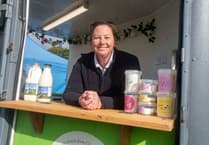Monmouthshire County Council has approved development plans to reduce its carbon emissions.
The council declared a climate emergency in May 2019 and the plans were examined by the Strong Communities Select Committee and debated by councillors last month.
The climate strategy has now been passed by full council along with plans to create a working group aimed at shaping the climate change strategy.
Climate change is one of the greatest challenges of the 21st century.
Significant change is needed before 2030 to limit global warming to no more than 1.5°C to minimise risks from extreme weather events such as storms, the loss of important species and habitats and the resulting impacts on people, businesses and communities.
The local authority is already doing many things to reduce carbon emissions.
The council has a solar farm and has installed solar panels on lots buildings which generate the equivalent of nearly 20 per cent of electricity the council uses and 99.5 per cent of the electricity used by the council last year was from renewable sources.
The council is installing electric vehicle charging points around the county and is working with a local company to pilot hydrogen powered vehicles.
In 2018 councillors asked The Gwent Pension Fund to begin disinvesting from fossil fuels.
Cllr Jane Pratt, Cabinet Member for Infrastructure and Neighbourhood Services, said: “These things on their own are not enough to tackle the Climate Emergency.
“New initiatives are required to make a difference across all communities and citizens in Monmouthshire – it’s about how we travel, live, eat, produce our food, shop and how we are inextricably linked to our environment.”
The council can’t reduce carbon on its own, the help of the public and businesses is vital.
“This all needs to be done whilst balancing the needs of enterprise and supporting our rural economy now and in the future,” she added.
“Officers have met with Community Climate Champions to ensure they are engaged in the development of the plan,” she said.
Simple steps all can take to reduce their carbon footprint include walking and cycling more, reducing, re-using and recycling waste and buying local food.





Comments
This article has no comments yet. Be the first to leave a comment.